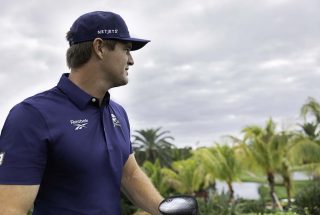Far Hills, N.J. – Edward “Ted” Horton, 64, of Canyon Lake, Calif., executive director of the California Golf Course Owners Association (CGCOA) for the past seven years, is the recipient of the 2008 USGA Green Section Award.
The Green Section Award is presented annually by the United States Golf Association (USGA) to recognize individuals who exemplify outstanding contributions and dedication to the game of golf through their work with turfgrass. The Award will be presented to Horton on Feb.1, 2008 at the USGA Green Section Education Program in Orlando, Fla., in conjunction with the Golf Industry Show.
“I’m thrilled by this recognition by the USGA Green Section,” said Horton, who has more than 40 years of experience in golf course maintenance. “I have always had the highest regard for the Turf Advisory Service staff and I credit a lot of my early success to assistance from USGA Green Section agronomists, who never hesitated to respond to my needs.”
In 1967, at age 23, Horton became the superintendent at Winged Foot Golf Club in Mamaroneck, N.Y. He played a key role as the club hosted the 1972 U.S. Women’s Open and the 1974 U.S. Open. He left Winged Foot to become superintendent at Westchester Country Club in Harrison, N.Y., and worked there from 1980-1991.
From 1991-92, Horton worked as vice president of agronomy for The Fairways Group in Manassas, Va. From 1993-2001, he was vice president for resource management for The Pebble Beach Company in California. During his time at Pebble Beach, he assisted the USGA with golf course responsibilities at the 1999 U.S. Amateur and the 2000 U.S. Open.
In his 33 years at Winged Foot G.C., Westchester C.C. and The Pebble Beach Company, he supervised course setups for five USGA championships and 28 PGA Tour events.
Horton helped establish the CGCOA in 1998 and has been its executive director since 2001. In that role, he is leading a cooperative effort to have all golf course agronomists share information and build customer service.
Horton is keen on making golf courses more environmentally friendly and he has earned several national and regional awards for his efforts, including the Golf Course Superintendents Association of America’s President’s Award for Environmental Leadership (1999) and Golf Digest magazine’s Environmental Leader in Golf Award (2000).
From 1992-2002, Horton served as a member of the Environmental Horticultural Science Department Advisory Council at California Polytechnic State University in San Luis Obispo, and on the President’s Advisory Commission on Agriculture and Natural Resources for the University of California, Berkeley, from 1998-2006. He is a member of the Agricultural Advisory Council for the University of California, Riverside. He also is the president of the California Alliance for Golf.
Horton received his educational training at McGill University in Montreal, Canada (agricultural biology), theUniversity of Massachusetts in Amherst (turfgrass management) and Manhattanville College in Harrison, N.Y.(club management).
The USGA is the national governing body of golf in this country and Mexico, a combined territory that includes more than half the game’s golfers and golf courses.
The Association’s most visible role is played out each season in conducting 13 national championships, including the U.S. Open, U.S. Women’s Open and U.S. Senior Open. Ten additional USGA national championships are exclusively for amateurs, and include the U.S. Amateur and the U.S. Women’s Amateur.
The USGA also writes the Rules of Golf, conducts equipment testing, provides expert course maintenance consultations, funds research for better turf and a better environment, maintains a Handicap System and administers an ongoing "For the Good of the Game" grants program, which has allocated more than $58 million over 11 years to programs that seek to grow the game. For more information about the USGA, visitwww.usga.org.
Contact:
Pete Kowalski (pkowalski@usga.org)
Web address: www.usga.org
USGA phone: (908) 234-2300
Covering the business of golf!



